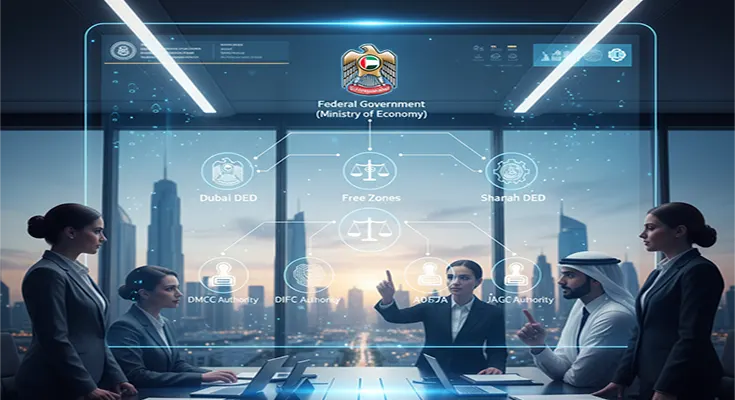Understanding the regulatory landscape is crucial for anyone venturing into business setup in UAE. The UAE’s economic dynamism is fueled by a well-structured legal framework, but knowing which entities oversee different aspects of company formation can be complex. My experience working with entrepreneurs launching businesses in the UAE has shown me the importance of grasping this regulatory ecosystem. This article aims to clarify the key players involved, providing clarity and direction for your entrepreneurial journey.
Federal Authorities and Their Roles in Business Formation
At the federal level, several ministries and entities play pivotal roles in regulating business setup in UAE. The Ministry of Economy (MOE) is central, setting the overall economic policy and promoting trade and investment. It oversees the registration of commercial agencies, intellectual property rights, and monitors the general economic climate. The MOE’s policies influence the ease of doing business across the Emirates. Then, there’s the Ministry of Human Resources and Emiratization (MOHRE), which is responsible for labor laws, visa regulations for employees, and ensuring fair employment practices. Navigating MOHRE’s requirements is essential for obtaining work permits and complying with labor regulations. The Federal Tax Authority (FTA) is another critical body. They administer and collect federal taxes, including Value Added Tax (VAT) and Corporate Tax. Understanding your tax obligations and registering with the FTA is paramount for compliance. Finally, the Central Bank of the UAE (CBUAE) regulates the financial sector. Businesses involved in financial activities, such as banking, insurance, or payment processing, must comply with CBUAE regulations. This often involves stringent licensing and reporting requirements.
Emirate-Level Departments of Economic Development (DEDs)
While federal authorities set the broad framework, the actual implementation and licensing of businesses usually occur at the Emirate level, primarily through the Departments of Economic Development (DEDs). Each Emirate (Abu Dhabi, Dubai, Sharjah, Ajman, Umm Al Quwain, Ras Al Khaimah, and Fujairah) has its own DED, which acts as the primary regulator for commercial activities within its jurisdiction. The DEDs are responsible for issuing trade licenses, registering companies, and overseeing commercial compliance. The process of obtaining a trade license varies slightly between Emirates, reflecting their individual economic priorities and strategies. For instance, Dubai’s DED is known for its streamlined online platforms and focus on innovation, while Abu Dhabi’s DED emphasizes strategic sectors aligned with its long-term economic vision. It is crucial to familiarize yourself with the specific requirements and procedures of the DED in the Emirate where you plan to establish your business. The DEDs also play a crucial role in enforcing commercial regulations, protecting consumer rights, and preventing unfair competition.
Free Zones and Their Independent Regulatory Frameworks
The UAE’s numerous free zones offer a unique regulatory environment that differentiates them from mainland companies. Each free zone operates under its own independent authority, which is responsible for licensing, regulating, and facilitating businesses within its designated geographical area. Free zones are designed to attract foreign investment by offering benefits such as 100% foreign ownership, tax exemptions, and simplified administrative procedures. However, it’s important to remember that each free zone has its own specific rules and regulations. These can vary significantly in terms of permitted activities, licensing fees, visa quotas, and reporting requirements. Therefore, carefully researching and selecting the free zone that best aligns with your business needs is paramount. For instance, some free zones are specialized in specific sectors, such as media, technology, or healthcare. Others offer a broader range of activities, catering to diverse industries. The regulatory framework of each free zone is typically designed to be efficient and business-friendly, but it’s still essential to understand the specific requirements to ensure compliance.
Sector-Specific Regulators and Their Areas of Oversight
Beyond the general regulatory bodies, numerous sector-specific regulators oversee particular industries. The Telecommunications and Digital Government Regulatory Authority (TDRA) regulates the telecommunications and digital sectors, ensuring fair competition and protecting consumer rights. Businesses operating in these sectors must obtain licenses and comply with TDRA regulations. The Securities and Commodities Authority (SCA) regulates the financial markets, including stock exchanges, brokerage firms, and investment funds. Companies involved in financial activities must adhere to SCA’s stringent regulatory requirements to ensure investor protection and market integrity. The Ministry of Health and Prevention (MOHAP) regulates the healthcare sector, ensuring quality standards and patient safety. Healthcare providers, pharmaceutical companies, and medical device manufacturers must comply with MOHAP regulations. The Knowledge and Human Development Authority (KHDA) in Dubai regulates the education sector, ensuring quality standards and promoting educational excellence. Educational institutions must obtain licenses and comply with KHDA regulations. These are just a few examples; many other sector-specific regulators exist, depending on the nature of your business. It’s crucial to identify the relevant regulators for your industry and understand their specific requirements to ensure compliance and avoid penalties.
The Role of Municipalities in Business Regulation
Municipalities, such as Dubai Municipality and Abu Dhabi City Municipality, play a crucial role in regulating specific aspects of business operations at the local level. They are responsible for issuing permits related to construction, land use, and environmental health and safety. Businesses often need to obtain approvals from the municipality before commencing operations, particularly if they involve physical premises or activities that could impact the environment or public health. These permits can cover areas such as building permits, food safety licenses, waste management permits, and signage approvals. The municipalities also enforce regulations related to zoning, building codes, and public safety. They conduct inspections to ensure compliance with these regulations and may issue fines or penalties for violations. Understanding the specific requirements of the municipality in your area is essential for avoiding delays and ensuring smooth business operations.
One free zone that stands out for its strategic location and business-friendly environment is Meydan Free Zone. They offers a simplified setup process, various licensing options, and access to a vibrant business community. It also provides a range of support services, including visa assistance, office space solutions, and networking opportunities.


